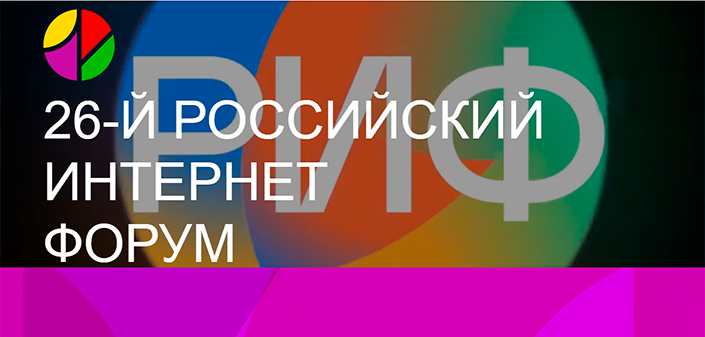
On May 18, the XXVI Russian Internet Forum was opened in the “Lesnye Dali” boarding house near Moscow. The Forum was started by the Minister of Digital Development, Telecommunications and Mass Media of the Russian Federation Maksut Shadayev, who held the "Runet Today and Tomorrow" talk show. The show was attended by VKontakte CEO Vladimir Kiriyenko, Rostelecom President Mikhail Oseevsky, Ozon Group representative Alexander Shulgin, Avito Commercial Director Igor Makarov, “Учи.ру” CEO Ilya Parshin, IT Vice President of Tinkoff Bank Vyacheslav Tsyganov. Andrey Vorobyev, Director of the Coordination Center for TLD .RU/.РФ, addressed the analytical panel that continued the opening ceremony of the RIF 2022. He spoke about the latest trends in the domain name registration market in his report "Domain name registration market in a new environment." “Despite the desire of certain representatives of state authorities of some countries, the international structures responsible for the stable functioning of the Global Network noted in their official statements that no national segments of the Internet can be discriminated against. The Internet is a single environment with common rules for all. At the domain section, we will talk about how the Russian domain market feels today. Let me just say that he feels good. This is confirmed by statistics: there are more than 5 million .RU domains, and 675 thousand names in the .РФ zone,” said the Director of the Coordination Center for TLD .RU/.РФ. The RIF business program included the "Sustainable Internet as a Basis for Russia's Digital Sovereignty" section, organized by the Coordination Center for TLD .RU/.РФ. The section was attended by Anton Gorelkin (Deputy Chairman of the State Duma Committee on Information Policy, Information Technologies and Communications), Ekaterina Mizulina (Safe Internet League), Igor Gudin (MMC Nornickel), Andrey Pyanchenko (Research Institute "Voskhod"), Alexei Rogdev (Technical Center Internet), Vladimir Zykov (Association of Professional Users of Social Networks and Messengers), Igor Astranin (AP-digital), Dmitry Grigoriev (EMG).
The section participants discussed the necessary actions and possible measures to further strengthen the digital sovereignty of Russia, technical and organizational aspects of the formation of a secure Runet. They gave examples of purposeful work to create an infrastructure of digital sovereignty, develop their own online services, and systematically support the IT industry.
Anton Gorelkin recalled that the law "On the sovereign Internet" has been in force for three years, and time has shown the correctness of its adoption and implementation. Despite the unprecedented scale of cyberattacks, the Russian Internet continues to work, and all critical infrastructure facilities are functioning normally.
The topic was continued by Ekaterina Mizulina, who called for the creation of a national system to counter DDoS attacks. She noted that domestic hardware and software should be used at critical infrastructure facilities, as stated in a recently signed presidential decree. Ekaterina Mizulina also drew attention to two aspects of ensuring the security of the Russian information space - technological and content. It is important not only to protect users from cyberattacks, but also from illegal and fake content, and this is a task not only for Internet companies, but also for the state.
Dmitry Grigoriev noted that the concept of "Sovereign Runet" is not limited to administrative boundaries, but covers, among other things, the mental boundaries of the "Russian world". “The Runet is where we write and think in Russian,” the speaker stated.
Andrey Pyanchenko spoke about the technological component of information security. He noted that at present, in the context of the sanctions policy by some foreign states and the community in relation to the Russian segment of the Internet, there are cases of refusals by foreign certification centers in issuing TLS/SSL certificates, as well as their revocation, etc. To counter such measures, the Ministry of Digital Development of Russia decided to create an information infrastructure to maintain the trouble-free operation of Russian information resources. For this purpose, on the basis of the National Certification Authority (NCA) at the Research Institute Voskhod, a certification center was created to issue TLS/SSL certificates based on foreign cryptographic algorithms. Now the work of such certificates is supported by domestic browsers Yandex.Browser and Atom.
“Today, Voskhod Research Institute provides an opportunity for Russian website owners to obtain security certificates without applying to foreign certification centers, which is important in the context of the sanctions policy,” the speaker noted.
And how the security of the Russian domain space is ensured will be discussed at the traditional Domain Section. Join us!



